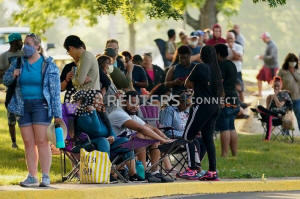As draw of city life faded for non-college workers, Blacks and Latinos
were squeezed hardest
 Send a link to a friend
Send a link to a friend
 [July 08, 2020]
By Jonnelle Marte [July 08, 2020]
By Jonnelle Marte
(Reuters) - Living in a large, expensive
city used to pay off for all workers by giving them a shot at better
jobs and bigger paychecks.
But the allure of city life has faded in recent years for workers
without college degrees, with opportunities diminishing the most for
Black and Hispanic workers, according to new research by Massachusetts
Institute of Technology economist David Autor.
Autor revisited a paper he wrote last year finding that employment of
workers without college degrees shifted between 1980 and 2015 from
middle-wage jobs to low-paying jobs. When he analyzed the racial
breakdown of the data, he found minority workers were more vulnerable to
the shift because they were more likely to be employed in service jobs
and less likely to be in professional, technical or managerial work.

"As the middle hollowed out, (minority workers) were more exposed to
middle-skilled work, and net of that, they were also over-represented at
the low end and under-represented at the high end," Autor said in an
interview.
City living continued to pay off for most people with college degrees,
but with one major exception: Black men.
College-educated urban Black men saw their employment in middle wage
jobs drop and their employment in low-paying jobs rise, mirroring the
trend experienced by workers without college degrees, Autor found in the
paper, the first in a series of briefs by the MIT Task Force on the Work
of the Future.
His findings are consistent with separate research done by economist Raj
Chetty finding Black men raised in poor urban neighborhoods are more
likely to end up in lower paying jobs.
[to top of second column]
|

Hundreds of people line up outside the Kentucky Career Center, over
two hours prior to its opening, to find assistance with their
unemployment claims, in Frankfort, Kentucky, U.S. June 18, 2020.
REUTERS/Bryan Woolston

The coronavirus crisis threatens to exacerbate the challenges for
Black and Hispanic workers by wiping out many of their jobs, Autor
said.
"In the short run, we just have massive amounts of job loss," Autor
said.
After movie theaters, offices, restaurants, bars and retail stores
shut down to slow the spread of the virus, it lowered the demand for
servers, bar tenders, janitors and sales clerks - low-wage service
jobs often held by workers of color.
Many businesses are shutting down again in some cities after a
resurgence of the virus. Others are operating with reduced staff.
During stronger economic times, workers without college degrees
might find decent jobs outside of big cities, but it's not clear
that more of those opportunities are becoming available during the
downturn, Autor said.
(Reporting by Jonnelle Marte; Editing by Dan Burns)
[© 2020 Thomson Reuters. All rights
reserved.] Copyright 2020 Reuters. All rights reserved. This material may not be published,
broadcast, rewritten or redistributed.
Thompson Reuters is solely responsible for this content.
 |